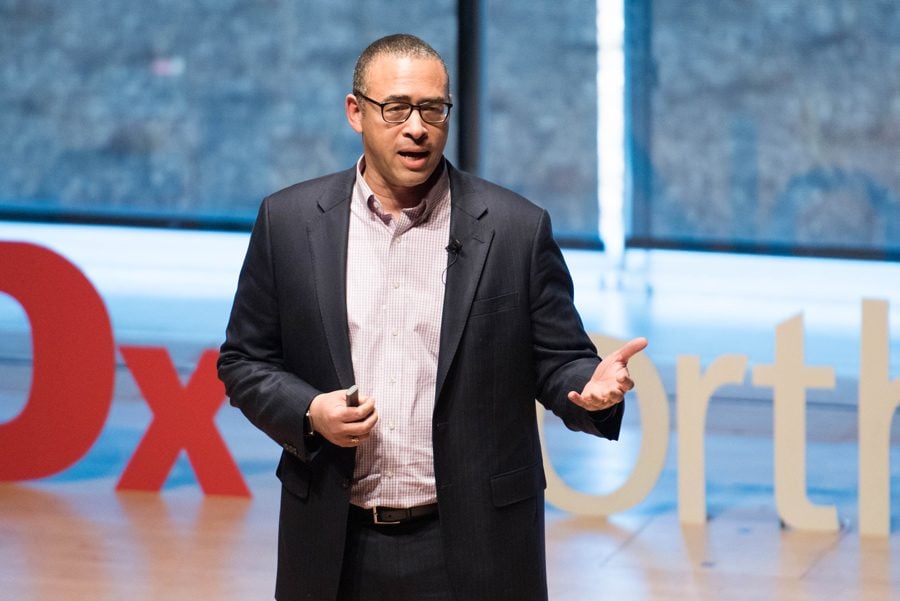University Provost, international attorney speak at TEDx Northwestern conference
(Lauren Duquette/Daily Senior Staffer)
Provost Jonathan Holloway speaks at Northwestern’s TEDx conference on Saturday. Holloway discussed the climate of political correctness on college campuses, especially amid protests and change.
April 29, 2018
College campuses should be places of experimentation and change where small actions contribute to a broader goal, Provost Jonathan Holloway said Saturday at Northwestern’s annual TEDx conference.
Holloway was the last speaker of the conference, held in the Mary B. Galvin Recital Hall, and rounded out a day of talks ranging from people’s obsession with perfection to artificial intelligence. This year’s conference — titled “Against the Grain” — featured speakers who have challenged the norm and addressed how small changes can gradually accumulate to have a global impact.
The conference also featured student group performances and screenings of official TED Talk videos.
During his talk, Holloway discussed the climate of political correctness on college campuses, especially amid protests and change. Holloway touched on his own experiences with protests and difficult conversations on campus from his time as a student at Stanford University and later as the dean of Yale College.
“Universities (provide opportunities for) experimenting and finding new voices and new ideas,” Holloway said. “Of course they are also charged with preserving old ideas and talking about what has value in those ideas.”
He said at Yale, faculty and students often looked to the University’s past to inform how they dealt with contemporary campus issues. Holloway added that he learned to appreciate this level of reflection and use the past as a model.
“College campuses, after all, are and should be dedicated to experimentation,” Holloway said.
Earlier in the day, International attorney Angela Walker (School of Law ’13) spoke about the variety of her experiences since graduating from NU. Walker said she has facilitated conflict resolution workshops in the aftermath of the Cambodian genocide, clerked at the International Criminal Court in The Hague and represented survivors of sexual violence in the context of armed conflict.
Walker told The Daily she understands first-hand the challenges of making a mark in a male-dominated field. She said when girls ask her about empowering themselves and finding their voices, she challenges them to answer three questions: “ask yourself who you are, what your passions are and how who you are aligns with your passions.”
Walker said she strives to use her work and legal practice as both a “healing opportunity” and platform to give women around the world a voice.
“Like the leaders before us, we start by asserting the power of our own voice,” Walker said. “When half of the world’s population has not been heard, our shared pursuit of global justice will fail.”
Bienen junior Ryan McHenry, executive director of TEDx Northwestern, said he and his team wanted this year’s theme to be both “broad … but at the same time provide a common thread” for the speakers who presented throughout the day.
To obtain necessary licensing from the TED parent organization — and permission to seat more than 100 audience members for the talks — McHenry and the associate director, Weinberg junior Rebecca Fudge, found out last summer that they had to attend a TEDGlobal event.
Six weeks and lots of last-minute fundraising later, McHenry found himself in Arusha, Tanzania, for the global event, surrounded by over 180 other TED organizers. He said the experience was eye-opening and “helped guide the process of how (they) went about organizing here at Northwestern.”
“We really wanted to emphasize this community atmosphere, where it wasn’t just a lecture series, but an opportunity for our audience members to exchange ideas with our speakers and each other,” McHenry said. “It’s not just, ‘you’re being talked at,’ but ‘you’re being talked with.’”
Kristina Karisch contributed reporting.
Email: [email protected]
Twitter: @jakii_98


